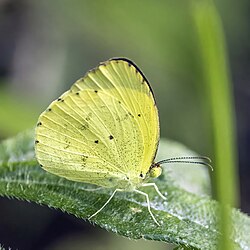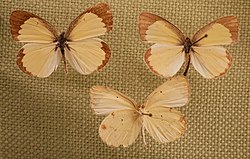From Wikipedia
Open on Wikipedia
| Eurema lisa | |
|---|---|

| |
| Male | |

| |
| Female Both P. l. centralis in Belize | |
| Scientific classification | |
| Kingdom: | Animalia |
| Phylum: | Arthropoda |
| Class: | Insecta |
| Order: | Lepidoptera |
| Family: | Pieridae |
| Genus: | Eurema |
| Species: | E. lisa
|
| Binomial name | |
| Eurema lisa | |
| Subspecies | |
| |
| Synonyms | |
Eurema lisa, commonly known as the little yellow, little sulphur or little sulfur, is a butterfly species of subfamily Coliadinae that occurs in Central America and the southern part of North America.
Description
[edit]
The wingspan is between 32 and 44 mm, not to be confused with the sleepy orange that is large and orange not yellow. The dorsal view of the forewing has a broad dark margin and the hindwing's ventral view has two basal blacks spots.
Range and habitat
[edit]The little yellow lives as far south as Costa Rica north through southern portions of the United States, they can be seen throughout much more of the United States but this is due to seasonal colonization from the south. Within their range they can be seen in open areas, most commonly old fields.
Life cycle
[edit]In the southern part of its range there can be up to five broods per year, while in the northern range there are between one and three. During warm days males patrol for females so they can mate. Females lay eggs singly on the midveins of their host plant.
Larval foods
[edit]Adult foods
[edit]The adults feed on the nectar of species in the genus Aster.
References
[edit]- ^ "NatureServe Explorer 2.0 Pyrisitia lisa Little Yellow". explorer.natureserve.org. Retrieved 3 October 2020.
- "Species Pyrisitia lisa - Little Yellow". Retrieved 2008-11-19.
- "Butterflies and Skippers of North America - Eurema lisa". Archived from the original on 2009-01-06. Retrieved 2008-11-19.
- "Species Detail Butterflies and Moths of North America". Archived from the original on 2009-05-05. Retrieved 2008-11-19.
- "Eurema". Retrieved 2008-11-19.
- F. Martin Brown and Bernard Heineman, Jamaica and its Butterflies (E. W. Classey, London 1972), Plate VI
About
No page comments added.Synonyms
- Little Sulphur
- Pyrisitia lisa
